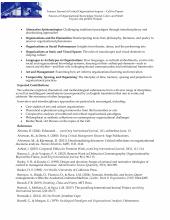This paper explores the concept of dominance in traditional rural and remote island communities in the Zadar island archipelago in Croatia. Like their EU counterparts, these communities struggle with geographical remoteness; island depopulation, irregular ferry connections, lack of entrepreneurship, unemployment and poverty. A previous study captured a complex web of communal relationships that play a part in minimising these negative effects on the island communities’ lives. This study focuses on studying one such behaviour - dominance and, thus, is concerned with two questions: How does dominance reveals itself, and what is its significance in practice? A conceptual and methodological approach consisting of living acts in Roman Ingarden’s spirit, ethnography, deconstruction and storytelling becomes a tool for observing the rural island communities’ experiences. In the process, the approach undergoes a qualitative metamorphosis – it co-exists and co evolves so to help us to better understand how island life unfolds. Findings show that dominance reveals itself as rada, signifying the approach of bonding the members into theisland community. Rada in this sense symbolizes Deleuze’s weapon against the governmental economisation. To engage and support the needs of the island communities, it is vital to understand how they make informal decisions, and studying local communal practices in this sense, has practical implications for the policy makers with the responsibility for small island development.





